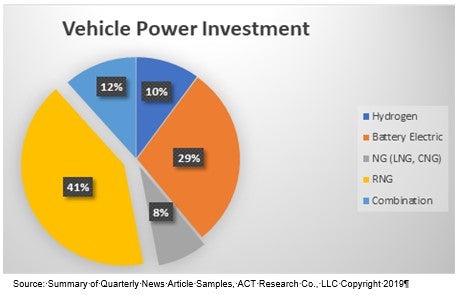While electric trucks get most of the hype for the future of trucking, cleaner-burning natural gas-powered Class 8 heavy-duty trucks sales are rising.
Fewer smog-forming nitrogen oxide emissions make natural gas trucks about 19 times cleaner than diesel models.
U.S. and Canadian Class 8 natural gas truck retail sales surged 43 percent in the first five months of the year. They fell 18 percent in the same period in 2018, according to Alternative Fuels Quarterly, released by ACT Research.

The fuel cost advantage that spurred natural gas as a diesel alternative early in the decade evaporated as oil prices have fallen from $90 a barrel to about $55 a barrel on Friday, August 2.
But oil prices aren’t the only prices that have fallen. Natural gas futures trade at three-year lows. A natural gas glut outpaces demand. Liquefied natural gas sold for $4.39 per thousand cubic feet in May this year. That is less than half of what it brought on the international market between 2010 and 2014.
The first liquid natural gas and compressed natural gas trucks arrived when ultra low sulfur diesel sold for more than $4 a gallon between April 2011 and March 2014. A gallon of diesel sold for an average of $3.04 on Friday, August 2.
Dominant fleets
Refuse fleets, transit and school bus operators dominate natural gas truck purchases, said Kenny Vieth, ACT Research president. Replacement demand drove most gains in over-the-road trucking.
“It makes sense that most of the sales are coming to those fleets that have had pent-up demand for upgrades,” said Bill VanAmburg, executive vice president of Calstart, a non-profit that promotes high-tech clean energy transportation alternatives.
Most natural gas trucks get their power from Cummins Inc., which makes the B6.7N natural gas engine for school, shuttle bus and medium-duty trucks, and the L9N engine for transit, refuse and other trucks.
Explaining the spike
Several factors explain the spike in natural gas truck purchases, Van Amburg told FreightWaves:
- The volatility of conventional fuel given current Mideast tensions makes the price stability of natural gas a safe harbor.
- Renewable natural gas earns credits in California that make it cheaper than even fossil natural gas. That improves the business case for fleet buyers.
- Validation and integration of the Cummins Westport ISX12N natural gas engine into multiple heavy-duty models.
- Public funding from the Volkswagen diesel emission settlement can offset the purchase of natural gas trucks.
Daimler Trucks, Volvo Trucks and Paccar’s Peterbilt and Kenworth brands all offer the Cummins Westport engine. The power plant generates 400 horsepower and 1,450-pound feet of torque while reducing NOx emissions to 0.2 gram per brake horsepower-hour (bhp).
NOx standard
While Cummins markets the 1SX12 as “near-zero” emissions, it may not be good enough for much longer. The California Air Resources Board (CARB) is considering reducing the 0.2 standard to between 0.015 and 0.035 gram per bhp.
NOx causes acid rain. It also forms particulate pollution and ground-level ozone, both of which cause adverse health effects.
CARB estimates on-road heavy-duty vehicles create about 33 percent of total statewide NOx emissions.








Pirkle
If California people hate 18 wheelers stop bringing them freight cause they apparently don’t understand if you bought it a trucker brought it. They are making small trucking business go broke but yet there marine diesel applications have no emission requirements hmmm
Chris Kroeker
Your article is incorrect – the Cummins ISX12N emits 0.02 g/bhp-hr (not 0.2, per your article), which makes it compliant to California’s proposed legislation.